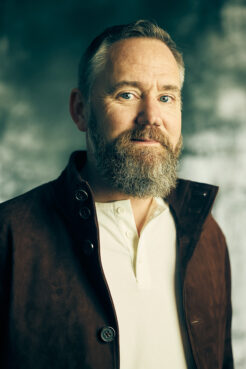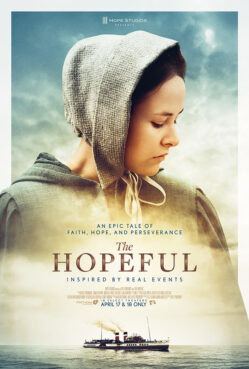(RNS) — A lifelong Seventh-day Adventist, Emmy Award-winning director/producer Kyle Portbury wasn’t always vocal about his faith tradition.
Growing up, he recalls hesitating to talk about going to church on Saturday or observing a 24-hour Sabbath, fearing friends would find his faith “weird.” But after years of directing and co-producing “The Hopeful,” a film about the birth of the Seventh-day Adventist Church, he’s discovered that people are more open to learning about his tradition than he thought.
“I think what it’s allowed me to do is feel confident that, actually, the origins of my faith are credible, and they are appealing to other people, and I’m going to be comfortable talking about that,” Portbury told Religion News Service. “It has hugely changed the way that I relate to my faith.”
Distributed by Fathom Events, the film is premiering in over 900 theaters across the U.S. for a limited release on April 17 and 18. And it isn’t just for Adventists — according to Portbury, the film tells a universal story about hope amid despair for people of all ages.
RNS spoke to Portbury about the story behind the film, misconceptions it addresses and what people of all faiths can glean from it. This interview has been edited for length and clarity.
Why did you say yes to this project?

Kyle Portbury. (Photo by Jeremy Cowart)
I think it’s always fascinating when you look at stories that have been mythologized. These characters, William Miller, Ellen and James White, Joseph Bates and Joshua Himes, are people, if you grew up Adventist, you’ve heard of, but they almost aren’t real people anymore. And so when I got the opportunity to pore through the archives, you see that these people had the same hopes, fears, dreams and desires everybody does. I think the inspiration was wanting to bring to life people, who just so happen to be part of a faith community, to explore how they persevered despite the disappointment they experienced.
This film shows the disappointment faced by many of the believers after Jesus did not return in 1844. Can you talk about including this visceral moment in the film?
Disappointment is really recognizable and relatable. It doesn’t have to be a disappointment of Christ not returning, it could be as simple as you anticipated getting a Christmas bonus, and it didn’t happen. In this modern era, we’ve almost made failure a bad thing. But very little learning comes from success. I think this film is an opportunity for families to discuss how to deal with failure. How do you move past something you didn’t anticipate? How do you learn from it?
What might this film show us about the role women played in the founding of the Seventh-day Adventist Church?
When you look at the character of Ellen, but also William Miller’s wife, Lucy, and Joseph Bates’ wife, Prudence, these are really strong women in an era when their influence and voice wasn’t necessarily taken seriously. And I think when you look at Ellen’s experience, at the beginning of the film she’s 17, and yet she has voice and agency in a man’s world and can speak up despite her significant health issues. She would not have ever imagined the legacy she has. This is a woman who had a third grade education, and is still recognized today as the most translated female nonfiction author of all time. In the faith genre of film, there’s not a lot of really strong female leads. We haven’t quite caught up to that. It’s exciting that we’ve been able to bring this story that shows men and women can both inspire other people and champion the gospel.

Kyle Portbury, second left, while making “The Hopeful.” (Photo courtesy Hope Studios)
You included two new songs by singer/songwriter Jonas Myrin in this film. Can you talk about how you came to include these contemporary songs in a film that takes place in the 19th century?
Jonas and I met on another film. He was inspired by the very rough draft of the film I shared with him, though it hadn’t been edited yet. Four days later, he sent me back two of the most beautiful demos I’ve ever heard. I was then inspired by those to reimagine the whole storyline. It’s funny because in a period drama, contemporary songs potentially shouldn’t work. But because it’s so much a part of the character voice and the narrative, it really just becomes quite naturally part of that world in a really beautiful way. And Jonas, he co-wrote the songs “10,000 Reasons” and “Cornerstone,” and he’s written for Andrea Bocelli, Lauren Daigle and Barbra Streisand, among others. So when you collaborate with someone of that caliber, you’re going to bring out things that you never could have thought of.
For viewers who are not Adventists, are there any myths or misconceptions about Seventh-day Adventists you hope the film addresses?

“The Hopeful” film poster. (Courtesy Hope Studios)
I just want to encourage people, if you have misconceptions or don’t know about this group of people, there are 22 million globally. I think a lot of Christians would be surprised to learn that in America, the Senate chaplain, who is the longest-serving Senate chaplain in the U.S. Senate history, is a Seventh-day Adventist. I think a lot of those misconceptions that Adventists maybe aren’t mainstream Christians, I think they’re going to be challenged. People will begin to see, these are just people like me. They just happen to believe one or two things differently.
What the world expects of Christians is often fear, prejudice and judgment. And I think this particular group, in this moment in the 1800s, realized the way Christ’s character was being represented was vastly different from what they were discovering. He isn’t judgmental and full of wrath, he’s a bringer of hope and healing. 180 years later, what are Adventists most known for? Hope and healing. Hospitals and education.
I hope Christians walk out challenged in how we are representing the character of Christ. Because these guys give us a model of, rather than going out to the world telling people what they should and shouldn’t be doing, they explore what bit of hope and healing they can bring into the immediate community.
How did you land on the film’s title?
It actually went through a number of different iterations, but I was always looking for a way of expressing that feeling of hope, both singularly and as a group. So when you walk out of the cinema after being inspired by the perseverance, and the wrestling and the doubt and love of these real people that really existed, how can I bring hope to my sphere of influence? Because it doesn’t have to be a legacy of 500 hospitals or a massive religious organization. It can simply be your neighbor going, “Oh, wow, these people that I live next door to, without any expectation or agenda, treat me in such a beautiful way.” What a great legacy that would be.